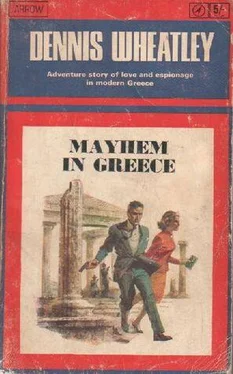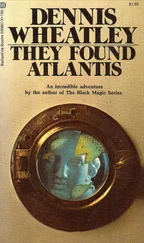When they had shut the garage gates, Tompkins said with a smile: 'Seems you got yourself in a spot of trouble, Mr. Robbie.'
'Yes,' Robbie agreed; then he added after a brief pause: 'They ... I think they mistook me for a pick-pocket.' Much as he hated having to lie to Tompkins, he could not possibly tell him the truth. A moment later, he remembered that he was wearing a dinner jacket which rendered most unlikely the explanation he had given, but Tompkins' only comment was:
'Well, we saw them off all right. Bit of luck for you, though, that I'd just dropped your uncle at the G.B.'
'Just dropped him!' Robbie echoed. 'I thought you must have taken some guests back to the hotel after a dinner party. Surely it's very late for him to have gone out?'
Tompkins looked at him in surprise. 'No later than usual for a reception, Mr. Robbie. The invites are mostly for nine-forty-five, and H.E. likes to show up round ten o'clock.'
Robbie had believed it to be at least midnight. So much had happened to him since he had, with the rest of the staff, left the agency at eight o'clock. It seemed impossible that all the nerve-racking experiences he had been through had been crammed into less than two hours; yet he could not doubt that Tompkins was right.
However, what Tompkins had told him held one ray of comfort. As his uncle was out at a reception, he could enter the house without fear of running into him. Having thanked the chauffeur warmly for rescuing him, he walked the length of the garden and entered the Embassy by a side door that led to the servants' quarters. In her sitting room he found the middle-aged lady of Anglo-Greek descent who acted as housekeeper.
A little hesitantly, he said: 'Good evening, Mrs. Gonis. I . . . er, expect you're a bit surprised to see me, but I didn't have a chance to let you know that I was coming back tonight. Could you get someone to make up the bed in my old room?'
She gave him a motherly smile. 'Oh, I've kept it made up, Mr. Robbie, hoping you'd be back any time. We were all of us quite worried about your going off like that on your own.'
'That's awfully nice of you.' He smiled back. 'Then I think I'll go up there right away.'
'Have you had your supper?' she enquired.
'No, as a matter of fact, I haven't,' he admitted. 'But I don't want to put you to a lot of trouble.'
'It will be no trouble at all. There's some of that moussaka you're so fond of in the larder. One of the girls can soon heat it up in a glass dish, and there's a big piece of the cassata in the fridge left over from dinner. I'll send them up on a tray with a carafe of wine to the little writing room, and you can have them on the table there.'
Robbie's worries had not impaired his appetite, and a quarter of an hour later he was tucking into the moussaka. It was his favourite Greek dish, a sort of shepherd's pie, but made with slices of aubergine between the layers of mince and on top, instead of potato, a thick crust of eggs and toasted cheese.
While waiting for his supper, he had been conning over the decidedly alarming situation in which he found himself. Although he had escaped arrest, he feared that that was very unlikely to be the end of the matter. It seemed certain that the Czechs would press the police to take action against him and that, if not tonight, certainly tomorrow, a police chief would turn up to demand some form of satisfaction from Sir Finsterhorn. His uncle would undoubtedly be furious and, being a stickler for justice, might even order him out of the Embassy, so that justice could take its course.
If only he had been able to retain the brief-case with those papers in it, he felt that things would have been very different. At least, he would have had that valuable prize to hand over as a set-off against any awkwardness that his escapade might cause between the Greek Government and the British Embassy. Unorthodox as his actions had been, his uncle could hardly have thrown him to the lions after he had pulled off a coup of which any real Secret Service agent might be proud. But he had had to abandon the brief-case, and he very much feared that his uncle might think that he had invented the whole story about it, in the nope that it might get him out of his mess.
By the time he was digging into the vanilla ice with its inner layer of chocolate and core of frozen cream, rich with bits of marron glace, angelica and glace cherries, his spirits had gone down to zero. He felt convinced that his uncle would sacrifice him to the accepted concept of an Ambassador's duty and insist on handing him over to the Greeks to stand his trial. Again awful visions of a bleak prison and its incredible discomforts harrowed his thoughts.
His immediate problem, he felt, was to decide on what he should say to his uncle next morning. Should he come clean and tell the whole, unvarnished truth, or should he seek refuge in another tissue of the lies that he was so unaccustomed to telling, protest his innocence and declare that he was the victim of a put-up job by the Czechs, designed to embarrass the British Ambassador?
The latter course seemed to offer a better chance of securing his uncle's protection; but would he believe him? And, in any case, that could not save him from his uncle's anger, because he could not have been made use of in that way had he not, against Sir Finsterhorn's strenuous opposition, taken a job with the Czechs. He wished most desperately that he had someone to whom he could turn for advice. It was then that his slow mind clicked, and he thought of Luke Beecham.
He could not have rung up Luke from the agency, but had meant to do so after it closed that evening. His hectic experiences since had put the matter right out of his mind, but there was no reason why he should not do so now. Leaving his cassata unfinished, he hurried across the hall to the secretary's deserted office, and called Luke's number.
As he feared might prove the case, Luke was not in, but his man answered. Mr. Beecham was out at a dinner party and, unless he went on anywhere, should be home before midnight. Robbie said that he wished to see Mr. Beecham on a matter of the utmost urgency. When he did get home, would he please come to the Embassy by way of the garage entrance, where Mr. Grenn would be waiting for him till any hour. Realizing that the man would go to bed if his master did not arrive home within the next hour or so, Robbie asked him to write out the message and pin it to Mr. Beecham's pillow.
Returning to the little writing room at the back of the house, Robbie finished his cassata and drank up what remained of the carafe of Attika Demestika wine that Mrs. Gonis had sent up with his supper. By then, it was a little after eleven so, in case Luke might get home early, he went cut into the garden.
It was a warm, cloudless night, with a myriad of stars shining brightly overhead. The sight of them made him think of the Immortals, after whom so many of the stars were named. Fervently, he prayed to his patroness, Athene, that Luke might not go on from his dinner party to the Coronet, the Flamingo, the Mocambo or one of the other Athenian night-clubs, as that would mean waiting for him until two or three in the morning.
Normally Robbie was not a heavy smoker, but as he paced up and down the parched lawn, keeping a watchful eye on the gate beside the garage, he lit cigarette after cigarette. At a quarter to twelve, he noticed the lights of the garage go on, and soon afterward heard the purr of the Rolls as Tompkins drove it off to bring home his master. Another ten minutes went by then, to his heartfelt relief, he saw beyond the iron grille of the side gate a dark figure, that caught the eye more readily owing to the starlight glinting on its white shirt front.
As he let in his visitor, Luke said: 'So you've returned to the fold, Robbie. Your having taken a job with the Czechs is the talk of Athens. I must say I give you full marks for having pulled it off; but a little bird told me that your uncle was so angry that he threw you out.'
Читать дальше












